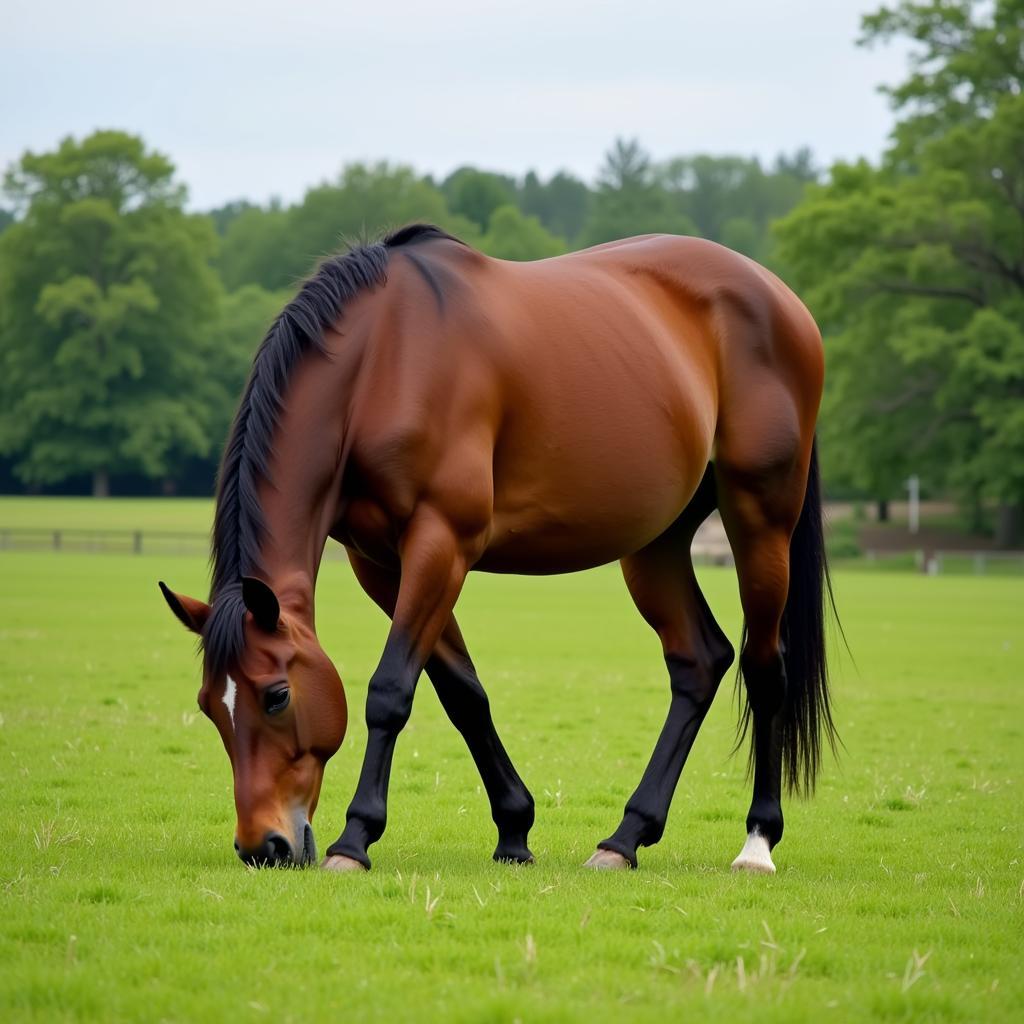As a horse owner, you know how important it is to protect your equine companion from pesky bugs. Flies, mosquitoes, and other insects can be a nuisance, causing irritation and even transmitting diseases. While commercial bug sprays are readily available, many horse owners are turning to Homemade Bug Repellent For Horses as a natural and often more affordable alternative. In this article, we’ll explore the benefits of homemade bug repellent and provide you with effective recipes to keep your horse comfortable and bite-free.
Why Choose Homemade Bug Repellent for Horses?
There are several reasons why you might opt for a homemade bug repellent over a commercial product:
- Natural Ingredients: Many commercial bug sprays contain harsh chemicals like DEET, which can irritate a horse’s sensitive skin. Homemade repellents, on the other hand, utilize natural ingredients like essential oils, vinegar, and herbs, which are gentler on your horse’s skin and coat.
- Cost-Effective: Homemade bug sprays can be significantly cheaper to make than buying commercial products, especially if you have a lot of horses or need frequent applications.
- Customization: You can customize your homemade bug repellent to target specific pests that are prevalent in your area or to address your horse’s individual sensitivities.
Effective Homemade Bug Repellent Recipes for Horses
Here are a few tried-and-true recipes for homemade bug repellent that you can easily whip up at home:
1. Apple Cider Vinegar Based Repellent
Ingredients:
- 1 cup apple cider vinegar
- 1 cup water
- 1/2 cup witch hazel
- 20 drops citronella essential oil
- 10 drops lavender essential oil
- 10 drops tea tree essential oil
Instructions:
- Combine all ingredients in a spray bottle.
- Shake well to ensure the oils are evenly distributed.
- Spray liberally on your horse’s coat, avoiding the eyes and muzzle.
2. Garlic and Citrus Repellent
Ingredients:
- 4 cloves garlic, crushed
- Peels of 1 lemon
- Peels of 1 orange
- 4 cups water
Instructions:
- Combine the garlic, lemon peels, and orange peels in a saucepan.
- Add water and bring to a boil.
- Reduce heat and simmer for 30 minutes.
- Strain the mixture and let it cool completely.
- Pour the cooled mixture into a spray bottle.
3. Skin-So-Soft Fly Spray
Many horse owners have found success using Avon Skin-So-Soft bath oil as a base for their homemade fly spray. You can find a detailed recipe and instructions on our website: homemade fly spray for horses with skin so soft.
 Horse Grazing Fly-Free
Horse Grazing Fly-Free
Tips for Using Homemade Bug Repellent on Horses
- Patch Test: Before applying any new repellent to your horse’s entire body, do a patch test on a small area of skin to check for any adverse reactions.
- Reapply Regularly: Homemade repellents tend to have a shorter duration of effectiveness compared to commercial products. Reapply every few hours, especially during peak insect activity.
- Store Properly: Store your homemade bug spray in a cool, dark place to preserve the potency of the essential oils.
- Combine with Other Fly Control Methods: For optimal protection, use homemade bug repellent in conjunction with other fly control methods, such as fly masks, fly sheets, and stable hygiene.
- Consult Your Veterinarian: If you are unsure about any ingredients or have concerns about your horse’s skin sensitivity, always consult your veterinarian.
Conclusion
Creating your own homemade bug repellent for horses is a rewarding way to protect your equine friend from pesky insects naturally. By utilizing simple ingredients and following these recipes and tips, you can provide your horse with relief from bug bites and ensure they enjoy their time outdoors to the fullest. Remember to always prioritize your horse’s well-being and consult with your veterinarian if you have any concerns.
FAQs About Homemade Bug Repellent for Horses
1. Are homemade bug repellents as effective as commercial ones?
While homemade bug repellents can be highly effective, their duration of effectiveness might be shorter than commercial products. It’s important to reapply regularly, especially during peak insect activity.
2. Can I use any essential oil in my homemade bug spray?
Not all essential oils are safe for horses. Some can be toxic or cause skin irritation. Stick to the essential oils mentioned in the recipes, and always do a patch test before applying to a larger area.
3. How often should I reapply homemade bug repellent on my horse?
Reapply your homemade bug repellent every 2-4 hours, or more frequently if your horse is sweating heavily or swimming.
4. What else can I do to protect my horse from bugs?
Combine homemade bug repellent with other fly control methods like fly masks, fly sheets, and proper stable hygiene.
5. Should I consult my veterinarian before using homemade bug repellent?
Yes, especially if your horse has sensitive skin or any existing skin conditions.
Looking for more DIY horse care recipes? Check out our guide on homemade fly spray for horses recipe.
Remember, when it comes to your horse’s well-being, it’s always better to be safe than sorry. If you’re ever unsure about an ingredient or have any concerns about your horse’s reaction, reach out to your veterinarian for guidance. For personalized advice on horse care or to explore a range of equestrian products, contact Justus Horses USA at 0772127271 or email us at [email protected]. We’re dedicated to supporting you and your equine partner every step of the way. Visit us at QGM2+WX2, Vị Trung, Vị Thuỷ, Hậu Giang, Việt Nam, where our team is available 24/7 to assist you.